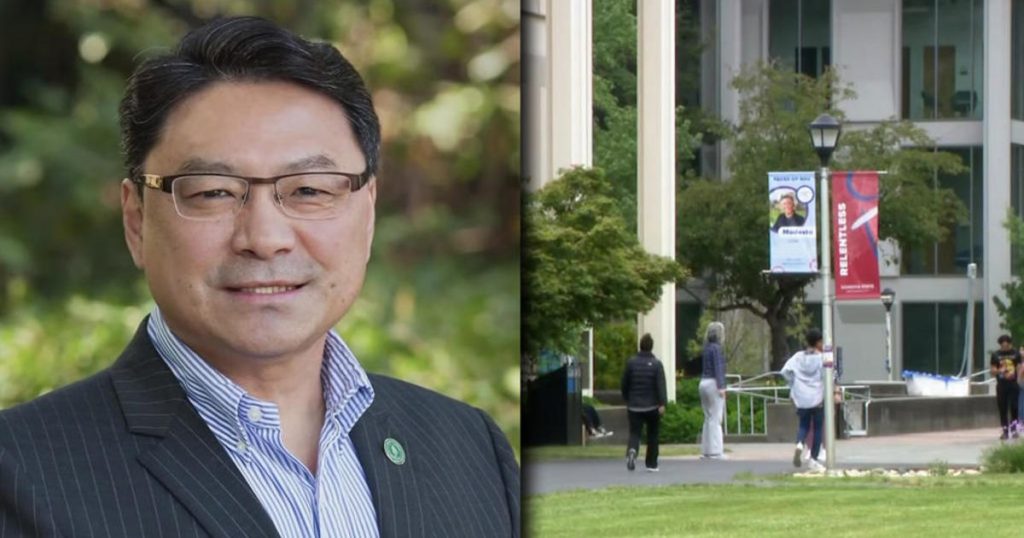Sonoma State University President Mike Lee has announced his retirement from his position at the school, following being placed on administrative leave after making an agreement with campus protesters regarding divestment from Israel. The agreement and subsequent email caused immediate backlash, leading to Chancellor Mildred Garcia to announce Lee’s administrative leave. In a statement, Garcia confirmed Lee’s retirement and thanked him for his years of service to the California State University system. Acting President Nathan Evans will take over during this transitional period. The controversy surrounding Lee’s decision also led to criticism from the California Legislative Jewish Caucus, who supported the suspension.
The email sent by Lee regarding the agreement with pro-Palestinian protesters was posted online by a student group, leading to the backlash and ultimately his placement on administrative leave. Chancellor Garcia stated that the decision was made due to insubordination and the consequences it brought to the system, confirming that Lee’s message was sent without approval. In a follow-up message, Lee confirmed that he acted alone in sending the email and that the points outlined were his alone and did not represent the views of his colleagues or the CSU. The California Legislative Jewish Caucus also released a statement supporting the suspension, calling Lee’s endorsement of an academic boycott “totally unacceptable” and evidence that he was unfit to lead a state institution.
The controversy surrounding President Mike Lee’s retirement and the agreement with protesters highlights the ongoing tensions surrounding the Israel-Palestine conflict on college campuses. The decision to divest from Israel is a contentious issue that has sparked debates and protests across various universities. Lee’s retirement signals a changing of leadership at Sonoma State University, with Acting President Nathan Evans taking over during the transition period. The fallout from the agreement and the decision to suspend Lee has also raised questions about academic freedom and the boundaries of university leadership in addressing politically charged issues.
The California State University system has faced criticism and scrutiny following the controversy surrounding President Mike Lee and the agreement with protesters. The decision to place Lee on administrative leave and ultimately his retirement reflects the complex dynamics of navigating political and social issues on college campuses. The support from the California Legislative Jewish Caucus for the suspension underscores the broader implications of Lee’s actions and the consequences of his decision. Moving forward, the university will need to address the aftermath of this controversy and ensure transparent communication and decision-making processes to prevent similar incidents in the future.
The retirement of President Mike Lee from Sonoma State University comes at a time of heightened political tensions and activism on college campuses. The agreement with protesters and the subsequent fallout demonstrate the challenges of balancing academic freedom, political advocacy, and institutional leadership within the context of contentious issues. As the university transitions to new leadership under Acting President Nathan Evans, there will be a need to rebuild trust and address the concerns raised by the controversy. The role of universities in addressing social and political issues will continue to be a point of debate, highlighting the complexities of maintaining a diverse and inclusive academic environment while also respecting differing viewpoints on controversial topics.
In conclusion, the retirement of President Mike Lee from Sonoma State University following the agreement with protesters and subsequent administrative leave reflects the complexities of navigating political issues in academic settings. The support for the suspension from the California Legislative Jewish Caucus underscores the broader implications of Lee’s actions and the challenges of addressing contentious issues on college campuses. Moving forward, the university will need to address the fallout from this controversy, rebuild trust, and ensure transparent decision-making processes to prevent similar incidents in the future. The transitioning of leadership to Acting President Nathan Evans signals a new chapter for the institution, sparking discussions on academic freedom, political activism, and the responsibilities of university leadership in addressing politically charged topics.


